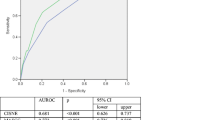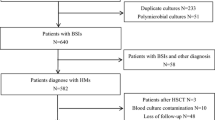Abstracts
Objectives
The purpose of this study is to evaluate the association of MASCC score (Multinational Association for Supportive Care in Cancer Score) in patients with febrile neutropenia (as resultant treatment of hematological disorders) for risk assessment of morbidity and mortality.
Patients and methods
Patients presenting with Febrile Neutropenia from November 2011 till December 2013 were enrolled in the study. Initially all patients were hospitalized and their MASCC score was calculated, however those with high risk stayed in hospital till full ANC recovery while low risk group was discharged earlier and keenly followed as out-patient while being on prophylactic oral antibiotics. The MASCC risk-index score was calculated and patients with risk score >21 were regarded as low-risk while <21 were labeled as high-risk.
Results
On the basis of 226 febrile neutropenia patient 132(58.4 %) were categorized as low risk while 94(41.5 %) as high risk patients according to MASCC risk index score. In low risk group 123(93 %) had uncomplicated infection while 9(7 %) had complicated infections. There was no mortality documented in low risk group while eight patients died in high risk group.
Conclusion
In this study we correctly predicted outcome of 123(93 %) low risk group patients. The study had positive predictive value of 93 % with both sensitivity and specificity of 65 and 75 % respectively. The MASCC risk score is a valuable tool in determining the outcome in patients with febrile neutropenia.
Similar content being viewed by others
References
Lyman GH, Kuderer NM (2003) Epidemiology of febrile neutropenia. Support Cancer Ther 1:23–35
Schilling MB, Parks C, Deeter RG (2011) Costs and outcomes associated with hospitalized cancer patients with neutropenic complications: a retrospective study. Exp Ther Med 2:859–866
Crawford J, Dale DC, Lyman GH (2004) Chemotherapy-induced neutropenia: risks, consequences, and new directions for its management. Cancer 100:228–237
Kuderer NM, Dale DC, Crawford J et al (2006) Mortality, morbidity, and cost associated with febrile neutropenia in adult cancer patients. Cancer 106:2258–2266
Segal BH, Freifeld AG, Baden LR et al (2008) Prevention and treatment of cancer-related infections. J Natl Compr Cancer Netw 6:122–174
National Comprehensive Cancer Network Clinical Practice Guidelines in Oncology (NCCN Guidelines®) (2012) Myeloid Growth Factors. v1
Layman GH, Abella E, Pattengell R (2014) Risk factors for febrile neutropenia among patients with cancer receiving chemotherapy: a systematic review. Crit Rev Oncol/Hematol. doi:10.1016/j.critrevonc.2013.12.006
Klastersky J, Paesmans M, Ruberstein EB, Boyer M, Elting L, Feld R, Gallagher J, Herrstedt J, Rapoport B, Rolston K, Talcott JA (2000) The Multinational association for supportive care in cancer risk index: a multinational scoring system for identifying low-risk febrile neutropenic cancer patients. J Clin Oncol 18:3038–3051
Freifeld AG, Bow EJ, Sepkowitz KA, Boeckh MJ, Ito JI, Mullen CA, Raad II, Rolston KV, Young JA, Wingard JR; Infectious Diseases Society of America (2011) Clinical practice guideline for the use of antimicrobial agents in neutropenic patients with cancer: 2010 update by the infectious diseases society of America. Clin Infect Dis 52:427–431. doi:10.1093/cid/ciq147
Viana LS, Serufo JC, Rocha MOC, Costa RN, Duarte RC (2008) Performances of a modified MASCC index score for identifying low-risk febrile neutropenic cancer patients. Support Care Cancer 16:841–846
Uys A, Rapoport BL, Anderson R (2004) Febrile neutropenia: a prospective study to validate the multinational association of supportive care of cancer (MASCC) risk-index score. Support Care Cancer 12(8):555–560
Moreau M, Klastersky J, Schwarzbold A, Muanza F, Georgala A, Aoun M et al (2009) A general chemotherapy myelotoxicity score to predict febrile neutropenia in hematological malignancies. Ann Oncol 20:513–519
Acknowledgments
We acknowledge our clinical hematology team for the cooperation in data collection, Ms. Arshi and Dr. Sajjad for the lab support. We are thankful to Miss Sumaira and Miss Sidra for maintaining our database in research department.
Funding
The authors have no support or funding to report.
Author information
Authors and Affiliations
Corresponding author
Rights and permissions
About this article
Cite this article
Taj, M., Nadeem, M., Maqsood, S. et al. Validation of MASCC Score for Risk Stratification in Patients of Hematological Disorders with Febrile Neutropenia. Indian J Hematol Blood Transfus 33, 355–360 (2017). https://doi.org/10.1007/s12288-016-0730-7
Received:
Accepted:
Published:
Issue Date:
DOI: https://doi.org/10.1007/s12288-016-0730-7




